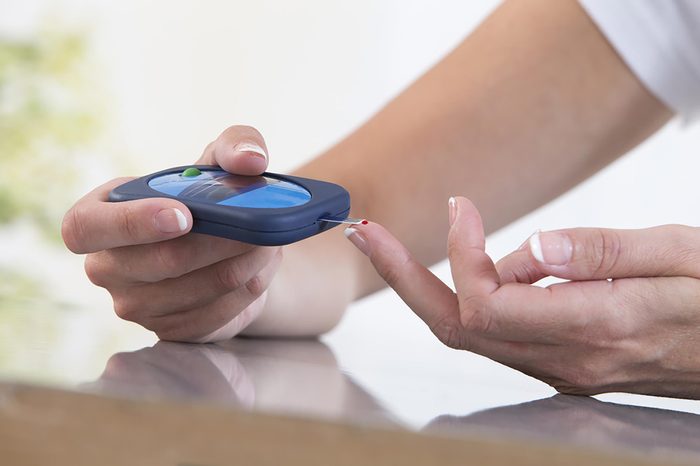
What is leaky gut syndrome?
Although it’s not a medically recognized condition, some health practitioners say that leaky gut syndrome causes a range of symptoms. Your gut is naturally porous—that’s how your body absorbs nutrients through the intestinal lining. But should the lining become damaged, larger molecules (called macromolecules) can escape the digestive tract and enter your bloodstream. “It’s like the intestinal lining has a skinned knee,” says David Edelberg, MD, medical director of WholeHealth Chicago. The result can be inflammation, bloating, stool changes, and fatigue.
But other doctors and health professionals argue there isn’t enough research proving that leaky gut syndrome is a true condition. There’s controversy if a leaky gut causes problems outside of the gastrointestinal tract. Many doctors and health professionals don’t recognize leaky gut as a diagnosable condition.
Check out what proponents say are potential leaky gut symptoms.

You’re grappling with food sensitivity
Leaky gut can trigger inflammation, but it may also be caused by inflammation in the gut. And the one way your gut can become inflamed is through food sensitivities—here’s how to tell if you have food sensitivities. Dr. Edelberg notes that there are few good tests for leaky gut symptoms; as a result, one of the better ways to get nearer to a diagnosis is to eliminate foods that are most likely to cause problems. There are six he focuses on, and he asks patients to try going without them for two to three weeks: dairy, egg, corn, gluten, citrus, and soy. Patients can then reintroduce the foods one at a time to identify their trigger.

You have gluten intolerance
Yes, it’s in the previous list, but gluten is one of the most common triggers for leaky gut, says Dr. Edelberg, and it deserves to be called out separately. If you notice you feel crummy—GI upset, bloating, lethargic—after eating bread, pasta, cereal, or other gluten-containing foods, your body may have trouble digesting this problematic protein. “Gluten is an inflammatory grain,” he explains. These are the signs you might have celiac disease and can’t process gluten.

You have joint pain
Dr. Edelberg occasionally will get patients complaining of general joint pain as one of the leaky gut symptoms. “There’s the sense of being achy all over,” he says. Their doctors will have run tests to look for rheumatoid arthritis (RA) that come back negative, he says, and that’s when his ears perk up: Often their pain can be a result of leaky gut syndrome symptoms. (Here’s what you should know about rheumatoid arthritis if you do have it.) The condition may have a root in autoimmune diseases, such as RA, according to research published Clinical Reviews in Allergy & Immunology.

Your GI system is wonky
You eat, you get bloated—here are some causes of bloating. Or maybe you’ve noticed that you’re running to the bathroom after eating certain foods. Changes in stool the other way—constipation—can also happen. You may also suffer from chronic indigestion or nausea. “These leaky gut symptoms may come and go for years,” says Dr. Edelberg. The problem is that patients will shrug off these issues or simply learn to live with them. These are the things that your bowel movement can reveal about your health.

Your skin is going haywire
While the connection is still a bit murky, it’s possible that leaky gut may be one of the root causes of acne in some patients, according to a 2018 study in Frontiers in Microbiology. Recurring eczema or psoriasis are other skin symptoms that get swept up in the gut-skin axis. Here are some other causes of an adult acne breakout.

You have high blood sugar
Leaky gut can trigger body-wide inflammation, and that can worsen insulin resistance, finds a Swedish study. Because insulin is crucial for managing your blood sugar, insulin resistance can lead to surges in blood sugar surges. That can lead to all kinds of trouble for your health: Elevated blood sugar along with high blood pressure and triglycerides can ultimately raise the risk of metabolic syndrome, a dangerous condition that worsens your odds of developing heart disease, stroke, and diabetes. These are the signs you might have metabolic syndrome.

You can’t figure out what’s wrong with you
Maybe you’ve gone to several doctors. The various treatments aren’t helping, and you’re still battling pain. “Patients will go to their doctor, get tested for different types of conditions, and then be told that the tests are normal. Then patients will follow up with a specialist who still can’t find anything. That’s what leads them to our office,” explains Dr. Edelberg. When a patient has stumped everyone else, Dr. Edelberg will try ruling out the symptoms of leaky gut.

Is leaky gut treatable?
According to proponents, you can treat leaky gut syndrome. The first step is to eliminate the trigger, says Dr. Edelberg. Then he has his patients take a glutamine supplement. “Glutamine is the fuel of the cell lining of the intestine and it helps regenerate the cells,” he explains. “Intestinal tissue is one of the fastest healing tissues in the body,” says Dr. Edelberg. The key is to learn how to meet the unique needs of your body. Other triggers can include painkillers like ibuprofen or aspirin and drinking too much alcohol. Try tracking the times when you feel lousy, and see if you can spot a pattern. That will go a long way toward helping you reach a diagnosis and find a way to eliminate your troubles. It can be a long learning experience, but one that’s worth it to help you feel your best every day. Next, don’t miss these silent signs your microbiome could be in trouble.

